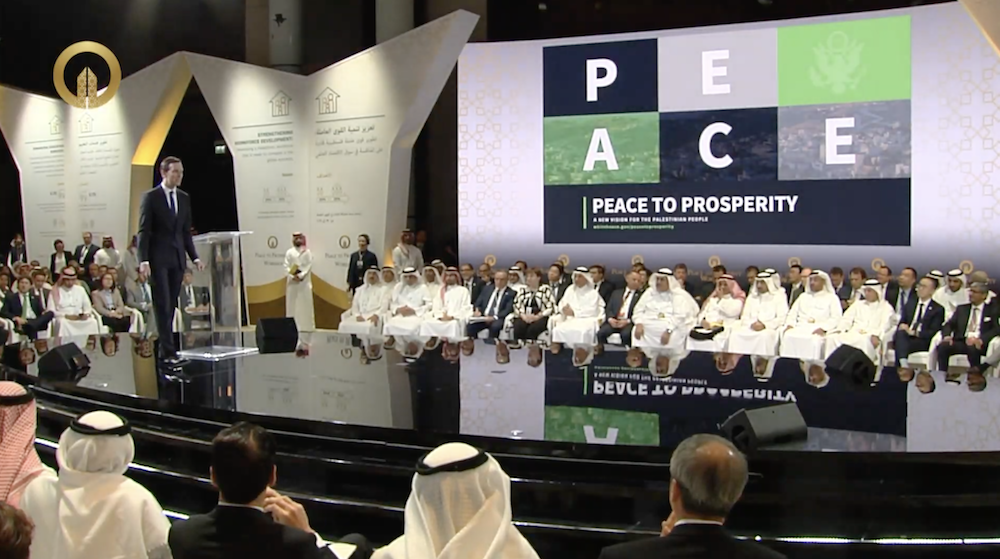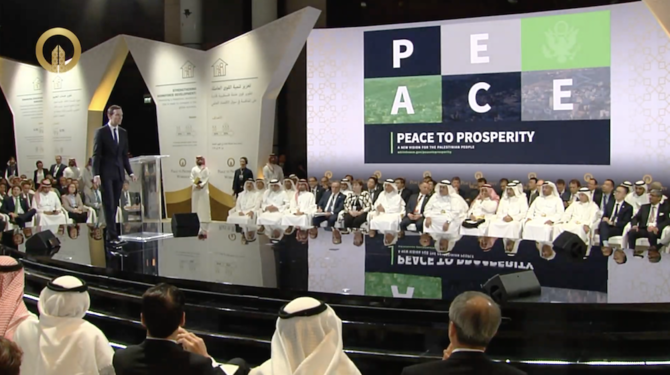MANAMA: White House adviser Jared Kushner on Tuesday urged the Palestinians to take the “Opportunity of the Century” to have $50 billion pumped into the stagnant economy of the West Bank and Gaza.
“My direct message to the Palestinian people is that despite what those who have let you down in the past say, President Trump and America have not given up on you,” said Kushner, the US president’s son-in-law, opening the “Peace to Prosperity” conference in Bahrain.
Kusher repeated an earlier caveat that his economic plan would not go into operation until there was a political solution to the Palestinian issue. “To be clear, economic growth and prosperity for the Palestinian people are not possible without an enduring and fair political solution to the conflict — one that guarantees Israel’s security and respects the dignity of the Palestinian people,” he said.
However, he surprised his audience of global business leaders, economists and politicians by saying the Palestinians must accept the economic plan before a political solution could be reached.
“Agreeing on an economic pathway forward is a necessary condition to resolving the previously unsolvable political issues,” Kushner said.
He dismissed mockery of the US peace plan as the “Deal of the Century,” and offered an alternative. “This effort is better referred to as the Opportunity of the Century, if the leadership has the courage to pursue it,” he said.
“We see tremendous potential. What we have developed is the most comprehensive economic plan ever created specifically for the Palestinians, and the broader Middle East. We can turn this region from a victim of past conflicts into a model for commerce and advancement throughout the world.”
Prominent figures taking part in the two-day Bahrain conference include International Monetary Fund chief Christine Lagarde, World Bank president David Malpass and former British Prime Minister Tony Blair.
Among the business leaders in Manama for the conference was Mohamed Alabbar, chairman of the UAE property and leisure group Emaar. He was optimistic. “If there is a one percent chance we do something good here, we should get together and try,” he said.
Saudi Arabia indicated support on Tuesday for “international efforts aimed at improving prosperity, investment and economic growth in the region.”
But Riyadh restated that any peace deal should be based on the Saudi-led Arab peace initiative that has been the Arab consensus since 2002. It calls for a Palestinian state in territory not occupied by Israel before 1967, with a capital in East Jerusalem and refugees’ right of return.
******
AS IT HAPPENED: SEE HOW THE FIRST DAY UNFOLDED BELOW - All times local (GMT +2)
21:54 Bahrain’s King Hamad bin Isa Al Khalifa met with the US delegation participating in the workshop at Al-Qudaibiya Palace.
The delegation included senior White House adviser Jared Kushner and Treasury Secretary Steven Mnuchin, the Bahrain state news agency BNA said.
King Hamad also received a letter from US President Donald Trump, BNA said.
21:10: Bahrain’s King Hamad bin Isa Al Khalifa met with the US delegation participating in the workshop.
The delegation included senior White House adviser Jared Kushner and Treasury Secretary Steven Mnuchin, the Bahrain state news agency BNA said.
King Hamad also received a letter from US President Donald Trump, BNA said.
21:00: The full details of the economic plan can be downloaded here.
Kushner briefly went through the main points and some of the figures, including the four overarching aims. They are doubling GDP, creating 1 million jobs, reducing unemployment and reducing poverty.

20:05: More from Kushner's speech earlier. When he moved on to outline the economic plan that was published Saturday, he addressed the absence of Palestinian business leaders at the Bahrain conference.
"A lot of the leading Palestinian business people who we speak to wanted to be here tonight. They were told by the (Palestinian) authority not to come and because they rely on them for their livelihood it’s not a free market where they can make those distinctions."
20:00: Mohamed Alabbar, founder and chairman of the UAE’s Emaar Properties says the Palestinian cause is one close to the heart of all Arabs.
#LIVE: #UAE’s Emaar Properties chairman and founder - Every Arab has the #Palestinian cause close to our hearts, we are all Palestinian at heart because the Palestinian issue is our issue #PeaceToProsperity
Stay tuned to Arab News for live coverage: https://t.co/x00UmdVF7H pic.twitter.com/wWSbgQgah4
— Arab News (@arabnews) June 25, 2019
19:45: Some more details from Jared Kushner's speech. He painted a picture of what could be in Gaza and the West Bank:
"Imagine a new reality in the Middle East. Imagine a bustling commercial and tourist center in Gaza and the West Bank where international businesses come together and thrive. Imagine the West Bank as a blossoming economy, full of entrepreneurs, engineers, scientists and business leaders. Imagine people and goods flowing quickly and securely throughout the region as economics become more integrated and people more prosperous.
"This isn’t a stretch, this is actually the historical legacy of the Middle East, specifically of Gaza and the West Bank."
19:45: The first panel - The Time is Now: Building a Coalition for Middle East Prosperity - gets underway, hosted by Nik Gowing.

19:40: Kushner says Palestinian self-sufficiency is the key to helping them reach prosperity, and will be vital in helping create a better business environment climate in the Middle East as a whole...
#LIVE: Jared Kushner at the #PeacetoProsperity conference in #Bahrain - We need to create a better business environment in the #MiddleEast, and part of that is helping #Palestinians to become self-sufficient
Stay tuned to Arab News for live coverage: https://t.co/x00UmdVF7H pic.twitter.com/GVXtZUuOvA
— Arab News (@arabnews) June 25, 2019
19:30: Kushner is now summarizing what the "Opportunity of the Century" economic plan actually entails for the conference...


19:25: Kushner tells the conference that the US wants to see peace, security and prosperity for Palestinians, Israelis and all people around the world and that the US has not "given up" on the Palestinian people.
#LIVE: Jared #Kushner speaking at #PeaceToProsperity conference - We want to see peace, security and prosperity for #Palestinians, Israelis and all people around the world
Stay tuned to Arab News for live coverage: https://t.co/x00UmdVF7H pic.twitter.com/uEqzd7qBIN
— Arab News (@arabnews) June 25, 2019
#LIVE: Jared #Kushner tells #PeacetoProsperity conference that his "direct message to the #Palestinian people" is that Donald Trump and the #US have not "given up on you"
Stay tuned to Arab News for live coverage: https://t.co/x00UmdVF7H pic.twitter.com/IZfUhAGNFc
— Arab News (@arabnews) June 25, 2019
19:15: We are under way, and Jared Kushner is speaking...
18:45: We are still waiting for Jared Kushner's address, and we are being treated to some dramatic music and this holding screen on the live stream...stay tuned, we will have some action shortly...

18:20: Dignitaries for the conference are still arriving and registering and enjoying a welcome reception, so let’s take a look at what we can expect on tonight and tomorrow’s agenda…
- Donald Trump senior advisor Jared Kushner will deliver the opening remarks, with a panel discussion on what the US administration’s plans for “Middle East prosperity” will entail. The panel will be moderated by Nik Gowing, a UK-based professor, author & broadcaster and will include Mohamed Alabbar, founder and chairman of the UAE’s Emaar Properties as well as Stephen Schwarzman, chairman, CEO and co-founder of Blackstone.
- Everyone will then enjoy an opening night dinner.
- Tomorrow, the highlights will be a panel entitled “Unleashing Economic Potential” — looking at how trade and job creation can help Gaza, the West Bank and the surrounding region — which will include Mohammed Al-Sheikh, Minister of State, member of Council of Ministers and member of Council of Economic and Development Affairs in Saudi Arabia.
- Kushner will hold a conversation with former UK prime minister Tony Blair, while just before lunch Arab News’ editor-in-chief Faisal Abbas moderates a panel on how to empower the Palestinian people to reach their full potential.














